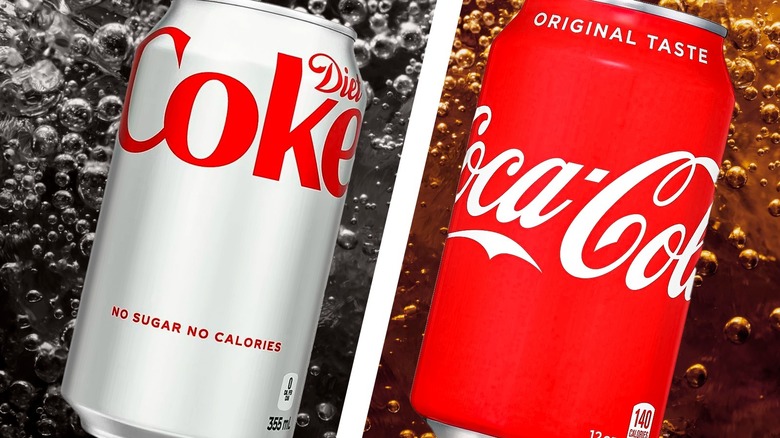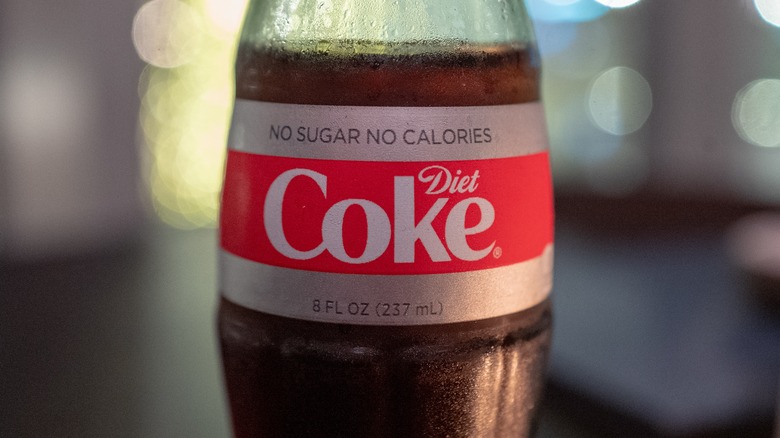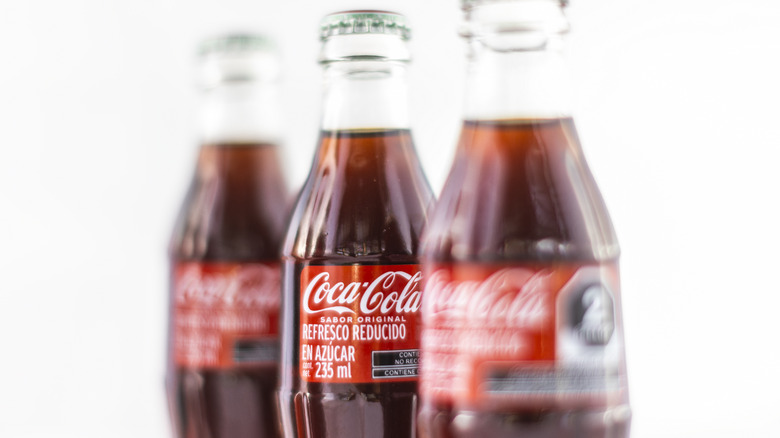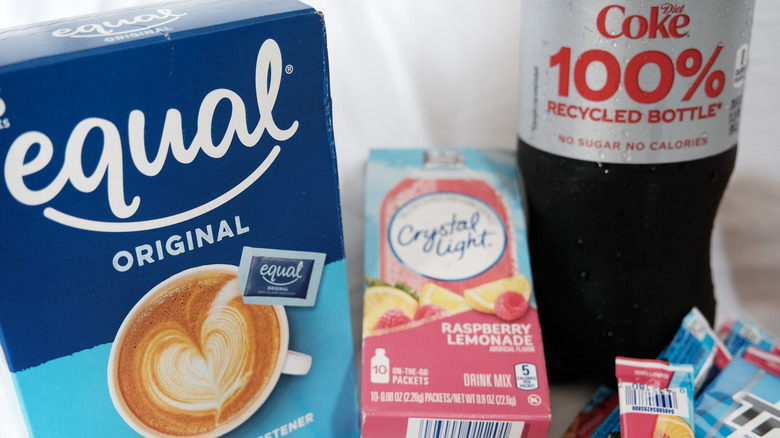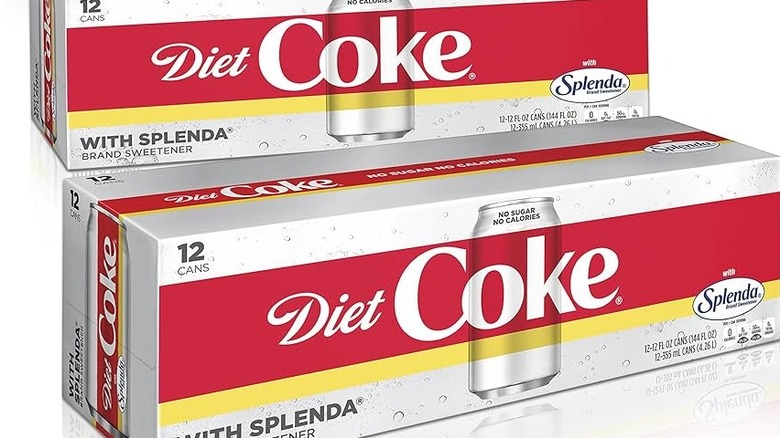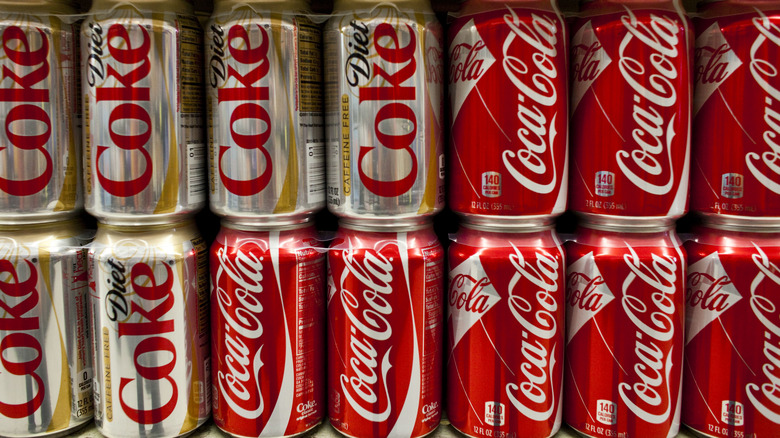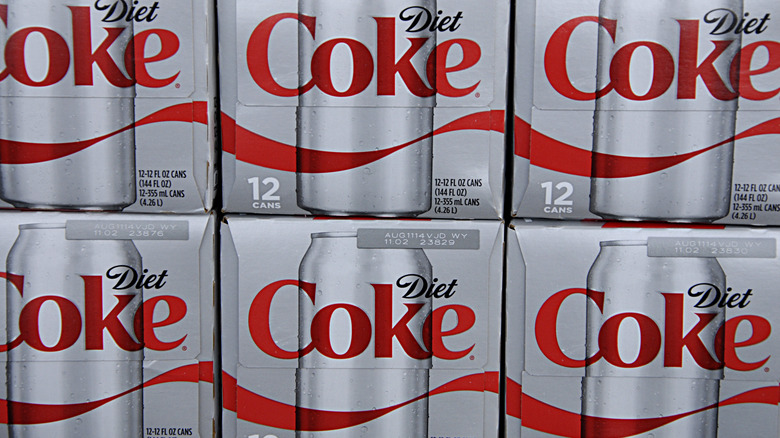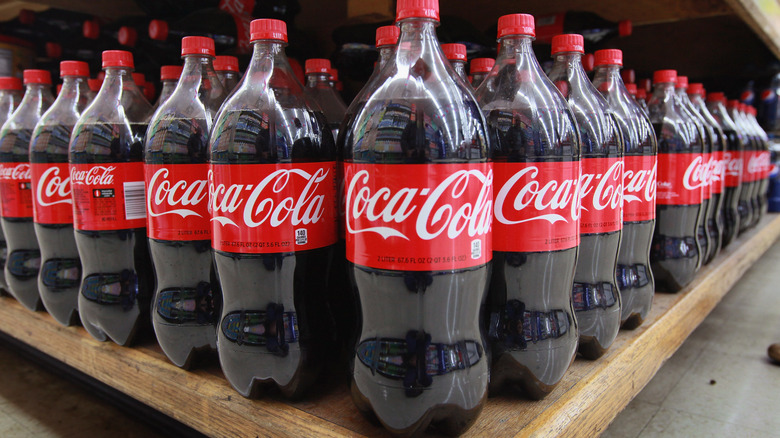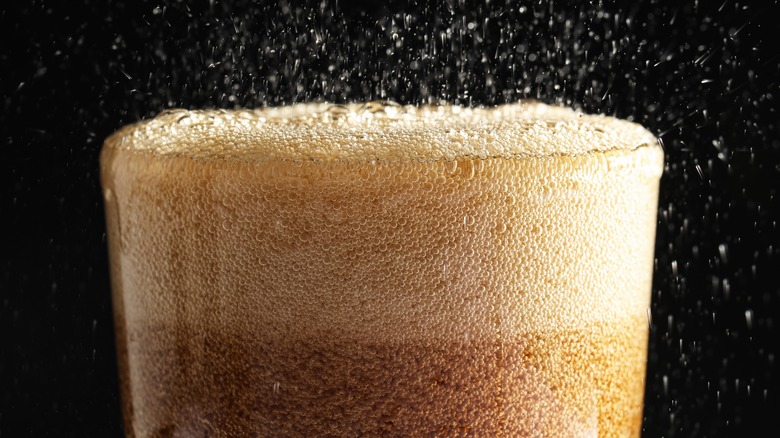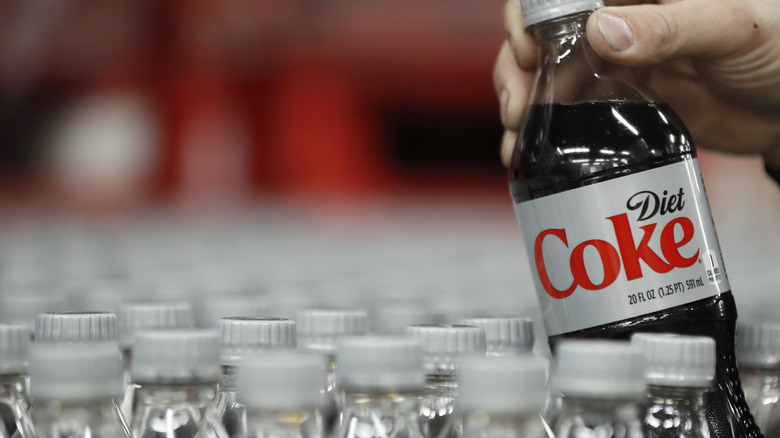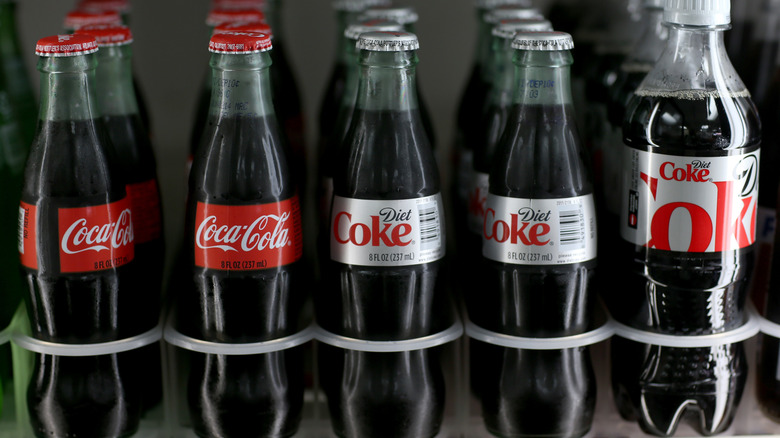Diet Coke Vs Regular Coke: Which Should You Choose?
We may receive a commission on purchases made from links.
Most regular soda drinkers are either Coca-Cola purists or Pepsi partisans — after all, there's a reason that "Is Pepsi okay?" is such a notoriously polarizing question. Among Coca-Cola devotees, however, are various sub-factions, each committed to a specific Coke flavor above all others. The prevalence of alternatives to the standard recipe, like Coke Zero or Cherry Coke, means that choosing a favorite cola can be more complicated than just sticking to a single soda brand.
Perhaps one of the most difficult decisions facing any prospective buyer is between original-recipe Coca-Cola and the comparatively leaner Diet Coke. As it turns out, there are plenty of reasons to pick one of these two products over the other, many of which simply depend on the purchaser's priorities. Here are the biggest differences between regular Coke and Diet Coke, each of which can help ease the process of choosing between them for anyone still undecided — and even strict adherents to one side might be surprised to learn some of the qualities that make each soda distinct.
The Coca-Cola Company created Diet Coke for an aging customer base
The first formulation of the original Coca-Cola recipe dates back to 1886. Of course, the version of the soda people enjoy today isn't made quite the same way, but regular Coke is well over a century old all the same. Diet Coke, meanwhile, is middle-aged, debuting to the soda-drinking public in 1982.
By that point, the Coca-Cola Company had already produced diet cola product Tab for almost two decades. Coca-Cola executives decided to introduce Diet Coke to expand the company's foothold in what was then a burgeoning diet soda market on the strength of the Coca-Cola brand name. Baby boomers who grew up drinking regular Coke but might have dropped the habit over health concerns were one of Diet Coke's target demographics. Aging Coca-Cola aficionados could revisit a childhood favorite thanks to its comparatively less unhealthy recipe.
The product caught on as planned. By 1983, the year after it hit store shelves, Diet Coke became one of the most popular soft drinks in the industry. Against all odds, the Coca-Cola Company kept producing Tab, even after its popularity inevitably faded. It was as late as 2020 that Coke finally discontinued Tab. Now, Diet Coke is the closest approximation for fans of the company's original diet cola product.
Diet Coke has (practically) no calories
The basis of what makes Diet Coke a diet-oriented alternative to the original recipe version of Coca-Cola is its lack of calories. When Diet Coke debuted, a can contained a single calorie. Since then, its calorie count has dropped to zero. That said, while the soda meets the requirements to claim zero calories, Diet Coke is technically not absent of calories altogether. Rather, a can of Diet Coke counts for just under half of a single calorie, courtesy of its artificial sweetener content. For all intents and purposes, Diet Coke is calorie-free, and it would take more than ten cans to equal the total calories in one cup of green leaf lettuce, for example.
By comparison, a standard can of regular Coke contains 139 calories. A 20 fluid-ounce bottle, meanwhile, contains 240 calories. Since non-diet soda qualifies as empty calories — meaning it's a food product that offers negligible nutritional value — even these relatively minor calorie counts can still have an impact. Diet Coke, then, is the preferable Coke product for anyone whose biggest deciding factor is the avoidance of unnecessary caloric intake.
Regular Coke contains sugar
The sole component of regular Coca-Cola that contributes to its calorie content is sugar. Specifically, a single, standard can of Coke contains 39 grams of sugar, and a 20-fluid-ounce bottle contains 65 grams. For many soda drinkers, of course, this is a good thing. While the detrimental health effects of excessive sugar intake are widely known, sugar in moderation is perfectly reasonable for plenty of diets. One major reason the human brain enjoys sugar is evolutionary — the glucose component of sugar acts as a source of energy for the human body, and the brain evolved to reward sugar consumption with dopamine.
It's worth noting that the sugar content in standard Coke doesn't come from table sugar but from high fructose corn syrup. That said, high fructose corn syrup isn't all that dissimilar from table sugar, despite what its comparatively worse reputation might suggest. Nevertheless, the fabled Mexican Coke — available in America — forgoes high fructose corn syrup in favor of cane sugar, providing anyone who wants to avoid corn syrup with a viable alternative. As a sugary treat, regular Coke easily wins out against its diet-focused sibling.
Diet Coke is made with aspartame
The ingredient that makes Diet Coke taste sweet while keeping its calorie content close to zero is aspartame. Because aspartame is more potent than standard sugar, significantly less of it is required to achieve a level of sweetness comparable to that of a can of regular Coke. Brand names under which aspartame is packaged include NutraSweet and Equal.
Naturally, there are at least a couple of drawbacks to products made with aspartame. Perhaps first and foremost is the fact that some people are averse to its flavor. Meanwhile, a genetic condition called phenylketonuria makes the consumption of aspartame dangerous due to the presence of an amino acid called phenylalanine. While phenylketonuria is rare, the effects of phenylalanine on anyone with the condition are serious, and the Nutrition Facts labels on cans of Diet Coke obligatorily warn away anyone who must avoid phenylalanine for this reason.
Aspartame does not, however, cause cancer. In July 2023, a report by the International Agency for Research on Cancer (IARC) described aspartame as possibly carcinogenic, causing something of a viral public health scare over the sweetener's alleged cancer risk. The IARC's findings, it turns out, did not convincingly determine a significant link to cancer according to interpretations by other organizations including the FDA. So, while there are some valid reasons to avoid aspartame, current science suggests that worry over its carcinogenic content isn't one of them.
There's a Diet Coke alternative made with Splenda, but good luck finding it
Just like somebody might prefer Pepsi over Coke for any number of reasons, each major artificial sweetener has its fair share of proponents and detractors. In recognition of this, the Coca-Cola Company produces a version of Diet Coke made with Splenda rather than aspartame, offering a comparable alternative to standard Diet Coke for either the aspartame-adverse or strict Splenda adherents.
Splenda is the brand name under which an artificial sweetener called sucralose is most commonly packaged. While there are naturally some chemical differences between it and aspartame, there are few substantive chemical reasons to pick one over the other. Anyone who should avoid phenylalanine intake should opt for a Diet Coke with Splenda over the aspartame-containing alternative.
Unfortunately for those who might prefer sucralose in their sweets, Diet Coke with Splenda is a rare commodity. Starting around 2020, the product became so hard to find that fans online began speculating that the Coca-Cola Company had discontinued it. However, according to a June 2023 post on X, formerly known as Twitter, Diet Coke with Splenda is still among the company's offerings. But even if it's technically in production, firsthand accounts online suggest that tracking down the soda might be futile for most people.
Regular Coke has a fuller flavor, but some people prefer the taste of Diet Coke
There's a simple reason the regular Coca-Cola recipe, sweetened with high fructose corn syrup, is the company's standard offering rather than its lower-calorie sibling — to most customers' palates, standard sugar should taste better than artificial alternatives like aspartame and sucralose. In fact, aspartame can trigger the tongue's bitterness receptors, and this can result in a serious aversion to its flavor.
That said, preferring the flavor of Diet Coke to regular Coke is not altogether uncommon. In a Reddit thread dedicated to unpopular opinions, u/Attarker wrote, "Diet Coke is way more refreshing than regular and has just the right amount of sweetness compared to regular Coke. Regular Coke is like drinking sweet battery acid and makes my teeth feel gross afterward."
Plenty of commenters agreed with this sentiment, albeit to differing degrees. While some argued that Diet Coke tastes better by every metric, other users suggested that its superiority is dependent on context. The most likely culprit behind a preference for the taste of Diet Coke is a palate accustomed to aspartame. Whether that's a result of habitual Diet Coke consumption or aspartame intake in other food products, eventually the brain may well develop cravings for aspartame that standard sugar won't satisfy. Whatever the case may be, regular Coke wins the flavor battle for most — but not all — soda drinkers.
Diet Coke has a higher caffeine content
Flavor isn't the only reason people drink Coca-Cola products. Both regular Coke and Diet Coke contain caffeine, and the energy boost that results from caffeine consumption is as good of a reason to drink Coke as any. While a standard can of regular Coke contains 34 milligrams of caffeine, a can of Diet Coke contains 46 milligrams. For a slightly more noticeable buzz, then, Diet Coke is the preferable cola product.
Neither of these quantities of caffeine, however, is significant compared to other common caffeinated beverages. For example, an 8-ounce cup of coffee contains 96 milligrams of caffeine, whereas a standard can of Monster Energy contains about 182 milligrams. Diet Coke is roughly equivalent to an 8-ounce cup of black tea, which contains 47 milligrams of caffeine. Daily coffee drinkers, then, most likely won't get much of an energy boost from a single can of Coke, but the typically caffeine-averse might notice an uptick in energy even from a can of regular Coke.
The Coca-Cola Company also produces caffeine-free versions of regular Coke and Diet Coke, so both products are still an option for anyone looking to avoid caffeine altogether.
Regular Coke is more acidic
Beyond differences in flavor and calorie content, one notable impact of the absence of real sugar in Diet Coke is a lower level of acidity. There are a variety of reasons some consumers might want to lower or avoid intake of acidic foods, from tooth decay to a natural sensitivity to anything high in acid. Of course, drinking soda is not recommended for anyone interested in lowering their acid intake, but Diet Coke wins out over its counterpart if it's an occasional treat.
Sugar is one of the leading contributors to decaying tooth enamel, whereas, in isolation, artificial sweeteners can help balance the mouth's pH level. That doesn't mean Diet Coke is harmless, however — it's still acidic enough to affect tooth enamel as a result of its carbonation. Diet Coke is only comparatively safer for teeth compared to regular Coke, but still detrimental to dental health on the whole. Nevertheless, if acidity is a concern, Diet Coke is a better choice if avoiding soda altogether is already off the table.
Diet Coke is fizzier
Fizziness in soda is part of the appeal for plenty of habitual soda drinkers, but not everyone reacts positively to fizzy drinks. That's because, according to a study conducted at USC, the brain processes soda fizz similarly to the spice in herbs like horseradish. Just as some people may seek the trademark horseradish burn while others avoid it, some people might prefer a flatter drink while others might want the fizziest soda possible.
As it turns out, Diet Coke is fizzier than regular Coke, so anyone with a fizz preference should choose accordingly. The reason for this is effectively twofold. On one hand, both aspartame and a preservative present in Diet Coke called potassium benzoate lower the liquid's surface tension, which eases its ability to produce bubbles. Diet Coke is also slightly more viscous than regular Coke, which helps preserve those bubbles once they do form.
Naturally, anyone sensitive to fizziness probably isn't seeking soda with regularity, but if so, they can opt for a regular Coke for a slightly less fizzy drink. Fizz seekers, meanwhile, should choose Diet Coke instead of the cola's original recipe.
Diet Coke is better for habitual soda drinkers
One type of consumer for whom Diet Coke is a clear winner over regular Coke is anyone with a soda habit. Drinking soda at a frequency of once every couple of months diminishes the impacts of the differences between the two colas significantly since occasional treats are unlikely to have much of a substantive impact on one's health. By comparison, anyone accustomed to drinking soda multiple times a week or even every day should take heed of the differences between regular Coke and Diet Coke, since they're amplified when consumed with regularity.
Simply put, replacing two cans of Coca-Cola with two cans of Diet Coke results in a reduction of 78 grams of sugar. By comparison, a chocolate chip cookie from Subway contains 19.3 grams of sugar. Replacing two cans of Coke a week with two cans of Diet Coke cuts out an amount of sugar equivalent to four Subway cookies over that one week. Coupled with a lack of calories, the benefits of transitioning from habitual Coke consumption to a Diet Coke habit speak for themselves — but only if that habit is unavoidable. Drinking soda isn't conducive to a healthy diet, so dropping a soda habit altogether is the healthier option if feasible.
Diet Coke and Regular Coke each has its place
Choosing between regular Coke and Diet Coke is ultimately a matter of personal preference. Anyone who wants the best-tasting drink possible and doesn't consume cola enough to necessitate concern over its health impact is likely best served by a regular old Coke. Other reasons to pick original-recipe Coca-Cola include prioritizing its slightly lower caffeine content or its comparatively lower level of fizz.
Reasons to drink Diet Coke, meanwhile, are perhaps more numerous but likewise depend on the individual consumer. Its lack of sugar, zero calorie content, higher dose of caffeine, and even its similarity to Tab are all valid justifications for why someone might opt for a Diet Coke instead of a regular Coke. It's also the soda of choice for those concerned with acidity or looking to lessen the impact of an existing soda habit.
So, while there's no objective winner between regular Coke and Diet Coke, there are plenty of reasons to pick one over the other that can help an educated consumer make the best choice for their particular set of needs.
